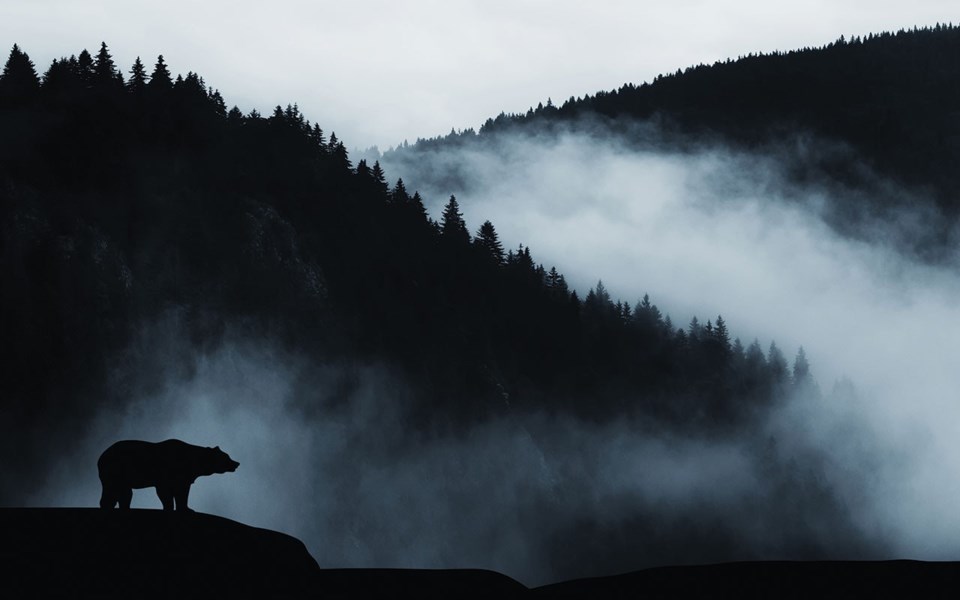There are vans and tents everywhere—pitched along the side of the road, the highway, the highway pull-outs, behind the Welcome to Whistler sign, on the road to the Squamish dump.
We drive past, befuddled: "Do they know this is the dump road?"
"Are they actually just setting up their folding chairs right there? In the ditch and the dust?"
"Maybe they're broken down."
"I think they're actually camping there."
"But it's the turn-off to the landfill."
Is this what middle age feels like? A continual state of perplexedness at the weird behaviour of the shining unwrinkled ones? For I am perplexed. It's July. And people are camping in the strangest places.
I'm trying to understand them rather than just mock them, because someone famous and cool said that's how you stay relevant. And if I'm searingly honest, I could just as easily have been them 20 years and two left turns ago—even though now, I have grown a crust so thick that the welcome mats laid at the door to the Sprinter vans parked along the access road to my local lake irk me irrationally. We're all victims to years of decimating cuts to parks' budgets that failed to anticipate a growing demand, to education budgets that axed outdoor education and access to nature, to increased student fees, to globalization and privatization and inflation and a thousand other small tyrannies that have compounded to make being 25 today much harder than it was when I bandit-camped my way around North America in a 1987 Toyota Tercel with two paid-for University degrees in my back pocket.
The British mythologist Martin Shaw says that there are old fairy tales that tell us that we were all born with a secret twin, a wild twin, who was sent into exile at the hour of our birth.
He writes that the work of becoming fully human demands searching out this long-abandoned character, for he or she has your life's purpose tucked in her pocket. "If there was something you were here to do in these few, brief years, you can be sure that the wild twin is holding the key."
I drive past the dump-side campers and on, to one of my favourite wild places. It's not deep wilderness, more a remnant that hasn't yet been paved over or encroached on yet. As I walk into the woods, alone in the dark, past the sign that warns of recent grizzly bear sightings, I feel a shiver of vulnerability. While it hasn't been domesticated, this place hasn't been entirely defanged, either.
"Wildness attracts everybody," writes Shaw, "but appears to be in short supply. Not feral, not hooligan, not brawling, but the regal wild. The sophisticated wild."
The shadow of an imagined grizzly bear across my path, I feel an inkling as to why my colonizing ancestors wanted to burn the wilderness down, wanted to cut the forests from hillside to the water line, to tame it, define it in units and board feet, as resources that they could use. Because the rising wild primitive is terrifying to confront, it is vast and awesome and full of power that we are no longer fluent in and it doesn't seem to care much for humans. We are hardly central or superior, certainly not to the hungry grizzly out roaming these woods, and that's tough to take. When we don't have the sophistication of ceremony, teaching, ritual, ways of approaching the power of the wild, if we don't have beliefs that teach us we are nurtured by that wild, that we can be in harmony with it, that we are co-creators and tenders and interpreters and whisperers, then we will resort to dominating it, in order to quell our mortal fear.
Is that why the vans stop just by the highway, in earshot of the reassuring hum of non-stop traffic? Or why the long-weekend adventurers congregate with hordes on the busiest trails, to be assured they're still in good human company? Do they seek out the most geo-tagged spots, desecrate the truly awesome places with garbage and pollution and habituated wildlife, because the word sacred has been stripped from their knowing, leaving them with a dull longing and the urge to jump into the van and drive until all they can see are trees?
I can't decide if the highway is lined with #vanlife ironic anti-capitalist protestors, campground overflow, fools, Generation Squeeze members just trying to get by, or exiles trying to come home, answering some flickery suspicion that we all belong, deeply, to a wild, powerful, beautiful, life-giving Earth. So I remain perplexed, and on the lookout, not for answers, but for my own wild shadow to beckon home.
The Velocity Project: how to slow the f*&k down and still achieve optimum productivity and life happiness.




